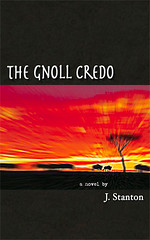 From an offline discussion about my novel The Gnoll Credo:
From an offline discussion about my novel The Gnoll Credo:
“There’s a lot to be found in very few words inside The Gnoll Credo—and that is precisely because I didn’t set out to write something deep or profound. I simply wrote down everything I knew about Gryka’s life, and how knowing her affected me—which gives the narrative a richness and verisimilitude totally lacking in polemics like (to pick two opposing examples) Ishmael or The Fountainhead.
“When an author sets out to make a point instead of telling a story, their characters are immediately demoted to the status of objects: bricks to construct metaphors, mouthpieces for polemic, puppets to perform a shadow play. The result may be clever and interesting, but it is rarely deep or profound, and almost never bears the sort of analysis you are bringing to the table. I believe this to be behind the postmodern obsession with authorial intent, though probably not consciously: when “characters” are almost always simple objects, all meaning flows from the author.
“In contrast, characters in a real narrative are autonomous entities. The narrative flows naturally from their actions. It contains the richness of their desires, fears, motivations, and history, not all of which will be explicitly stated in the text—and it can be analyzed on its own terms, as a description of events.
“This is a much richer ground in which to forage for meaning. To use a metaphor, “making a point” is agricultural. It can create one specific idea, very quickly…but anything else is pollution or a weed, and there is little to explore in a field of Roundup Ready soybeans. In contrast, “telling a story” is organic, wild, complex, forest and jungle and savanna and desert, a living community within which foraging can be very rewarding…
…for those with eyes to see.”


